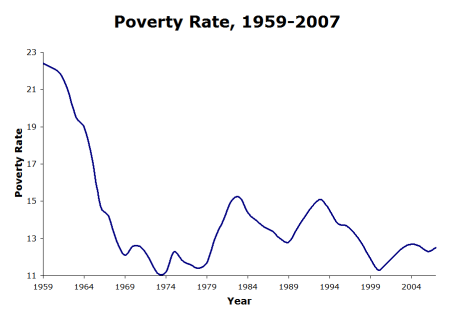The term war on poverty officially came into being in 1964 and referred to concerted government efforts to eradicate assiduous poverty in the United States of America (University of Virginia).
The main intention of declaring war on poverty was to empower less fortunate members in United States of America both materially and intellectually so that they would in turn assist themselves and rise from abject poverty. Poverty was such a great social problem in the 1960s. The most prominent person involved in the declaration of war on poverty was President Lyndon Johnson in a 1964 Union address (University of Virginia).
Consequently, the federal government joined hands with state and local governments as well as nonprofit groups and community based groups to design organizational foundation to fight poverty, address human rights and ultimately, check increasing racial disparities in the United States of America.
War on poverty signaled new beginning for American liberalism and boosted the spirit of welfare in America. War on poverty led to drafting and passing of various legislative bills, the most notable bill being the Economic Opportunity Act of 1964 (University of Virginia).
The bill led to the formation of the Office of Economic Opportunity, the Community Action Program (CAP), the Job Corps, the Neighborhood Youth Corps, Neighborhood Development Centers, Volunteers in Service to America and other groups focusing on poverty eradication. In addition, the anti poverty drive led to provision of small commercial credit, rural focused services, migrant worker services, correctional education programs as well as the setting up of health care centers (University of Virginia).
Lack of equal opportunities in the United States of America, which resulted from institutionalized racism, led to war on poverty (Yglesias). The government realized that poverty resulted from lack of opportunities for citizens considered inferior in race.
As such, opportunities existed for white people and others had to take up odd jobs like working on plantations under poor conditions and mistreatment. Opportunities to good education, health, and housing remained a preserve of the white community. This led to war on poverty since poverty among the minority groups led to overall poverty in the United States of America (Yglesias).
The anti poverty drive led to enactment of various legislative acts including the Revenue Act of 1964, the Civil Rights Act of 1964, the Food Stamp Act of 1964.
Others were, the Elementary and Secondary Education Act of 1965, the Social Security amendments that created Medicare in 1965, the Voting Rights Act of 1965, the Fair Housing Act of 1968 (University of Virginia). It also led to creation of the Department of Housing and Urban Development in 1965 as well as the inception of various work training programs and other projects, whose main aim was to fight poverty.
The war on poverty has been such a great success. It has led to steady decline in poverty levels from as high as 22 percent to 11 percent in 1959 and 1974 respectively. Recession during the Reagan administration eroded gains achieved on war on poverty but poverty levels have remained lower compared to the 1960s period (Yglesias). The graph below shows decline in poverty levels between 1959 and 2007.

Structural conditions that led to poverty included lack of opportunities to jobs and other social amenities by minority groups in America coupled by institutionalized racism. Such conditions no longer exist as America grants opportunities to all citizens without favoring anyone or discriminating against any citizen (Yglesias).
Works Cited
University of Virginia. War on Poverty. n.d. Web.
Yglesias, Matthew. The War on Poverty was an Enormous Success. 2009. Web.